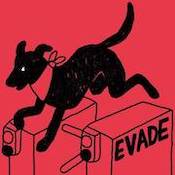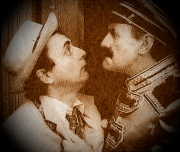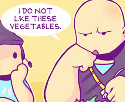Taciturn Tactician posted:Why did they save every rejection letter to be able to weigh them? Does this man just have a sack of sadness that he reaches into to pull out a rejection letter to read and feel bad about? Stephen King talks about keeping all his rejection letters in On Writing too, and I've heard of it from a lot of other established writers. I think holding onto them is some people's way of both thumbing their nose at the universe and keeping humble about their own work. Plus years later, when you've got multiple NYT bestsellers, you can look back and see how far you've come.
|
|
|
|
|

|
| # ? May 1, 2024 09:21 |
|
Taciturn Tactician posted:Does this man just have a sack of sadness that he reaches into to pull out a rejection letter to read and feel bad about?
|
|
|
|
Now it's gonna be whose email folder has the most gigs
|
|
|
|
With respect to short story rejections, I frequently think of this blog post: https://thewaronloneliness.com/2016/10/28/recently-got-my-fifteen-hundredth-short-story-rejection/ Rahul has published ~50 short stories in pro- and semi-pro markets, and has a story in The Year's Best Science Fiction & Fantasy 2017 Edition. So like...a pretty successful writer. I think he is atypical in terms of submission numbers (higher) and success rate (lower?) for authors who have this many stories published. He says so as much himself in his blog post for his 1000th rejection. Still, I find it a useful point of reference. It is both encouraging and terrifying, depending on how I am feeling. Hopefully General Battuta (also included in the Year's Best 2017 anthology!!) will come by and can share his experience as well. Dr. Kloctopussy fucked around with this message at 22:21 on Oct 2, 2017 |
|
|
|
I hate planning. I always feel like there's something I'm forgetting in the outline and it gives me a rotten headache.
|
|
|
|
I've got a question on ideas/premises, specifically, how do you come up with better ones? I know the general wisdom with writing is that premise is usually far secondary to execution. Setting that aside, though, I find my story ideas tend to only have one or two interesting moments or shards of an idea, or just feel flat and reminiscent of lots of other things I've read/seen/whatever. Is there any way to "practice" coming up with better story concepts? Is it just something you get better at with time and experience? Am I looking at my problem of flat story ideas all wrong?
|
|
|
|
|
Three weeks in on my revisions to Brigade, 30,000 words deep. It's going a lot slower, partly because of IRL stuff, and partly because I'm still juggling moments from the original draft to save and work back in. So I'm always a bit conscious of where I'm taking things and how I'm building things up, and what exactly I could save and how much of it I should rewrite. I'm pretty happy with it so far though. The middle of the book is going to be drastically different, so that'll be fun to explore.
|
|
|
|
MockingQuantum posted:I've got a question on ideas/premises, specifically, how do you come up with better ones? I know the general wisdom with writing is that premise is usually far secondary to execution. Setting that aside, though, I find my story ideas tend to only have one or two interesting moments or shards of an idea, or just feel flat and reminiscent of lots of other things I've read/seen/whatever. It sounds to me that you are actually coming up with ideas, but are struggling to expand them into functioning stories. I think this question originated from writing for Thunderdome, and for flash fiction, one or two interesting moments is nearly all a story can handle. I think the next step is to find ways to connect them meaningfully. With shards of ideas, finding ways to push or pull things out of them, twist them around. I know this sounds incredibly vague, but there are many, many ways to do this. It does require practice to find a way that works for you. Here's what I do: I start by asking myself questions about what I've already got: what makes the moment interesting and why? Who are the characters in it? what is their relationship? How did they get there? How do they get to the next moment? What else could happen? What if they had a different relationship? On and on and on. Where could it go and what could it mean? As I go through questions, the idea expands and changes, and then there are new things to ask questions about. At some point, elements begin to click together: I have characters that feel sufficiently solid and have motivations. Their motivations drive the "action." The action and its consequences make sense in context. The action has an effect on the characters. That's not a formal checklist I go through or anything, but I think those are the elements that are most often in place when I feel the intuitive "click." Alternate option: deadline is in 2 hours and I go with whatever seems the least bad. With flash fiction, I try to focus on finding a general "mood" and a satisfying ending. Here's an excerpt from my brainstorming from Wizard Week 2: (prompt: https://forums.somethingawful.com/showthread.php?threadid=3803906&perpage=40&pagenumber=55#post473992770) (final story: https://forums.somethingawful.com/showthread.php?threadid=3803906&userid=0&perpage=40&pagenumber=58#post474213508) My assigned wizard power was gaining power by placing sigils and symbols in public view. I have no idea why, but for some reason I thought the "obvious" way to go about that was becoming a graphic designer, and that was my only starting point. quote:Wizard Week - Sigils and Symbols in Public View This goes on for 8 pages (!!!) before I really started writing, though a few experimental excerpts ended up in the final. Working on a novel now and I have over 100 pages of stuff like this as I gradually work out what will happen. Not sure if this is going to be a particularly successful strategy for long-form works, but it's what I know how to do. The things that have "clicked" for me in those hundreds of pages have definitely strengthened and expanded on my original idea, so....fingers crossed? Also, in case it helps, here are some ways to try to come up with ideas: Dr. Kloctopussy posted:
|
|
|
|
One trick is to think of something really dumb and obvious then nudge it until its not obvious and it interests you. That way you're never in the paralysing position of needing to come up with a Really Good Idea.
|
|
|
|
A good question I got asked is "Why do you want to write this? What are you trying to say?" So before I write my stories I ask "why do I want to tell people this story?" like, am I mad about something? scared of some future i've dreamed up? worried about how others might see me? those all become qualities i give my characters/stories. I figure if that's stuff i'm thinking about, probably other people are thinking about that stuff too, and might identify with it. so take your concepts and plug them into that context. WHY do you want to focus on this idea you have? You might have to tweak the idea a bit to get it to fit, but it's doable. Like if you want to write a scifi/fantasy story that deals with aliens and crystals with magical powers think about it in terms of "I'm worried I won't ever make enough money to live comfortably while everybody else around me seems to be doing pretty well. am i just stupid, or is there something i'm missing here?" then that turns to "This one guy collects magical crystals to harvest their energy but some aliens come in and take most of them and he has to get them back but in the end the real magic was inside him all along he just had to believe in himself" type deal. don't steal my magical crystal story idea tho ģme
|
|
|
|
Steal. edit okay FINE maybe I'm jaded. I start with a lovely basic idea and think about it for five days. Then think about getting around to writing. And then Sunday I hit the oh poo poo panic button and it all comes out at once. I'm sure there's a better approach. Edit edit: this week is a little harder because the basic theme is WIDE OPEN, (Belgium).
|
|
|
|
yes what crab and doc said. if you are in a hurry then looking inside yourself at what is grinding your gears right now then messily slapping it on the page layered with some weirdass genre pot pourri is where it's at because even if it's terrible it will still be interesting.
|
|
|
|
4 weeks in 45,000 words in. I've crossed past the stuff I can easily re-purpose even with heavy editing and have entered new territory again. We'll see if I can maintain my 10,000 words per week tempo! It's going slower than the original one again, but I'm also finding myself less time to actually write so I'm not super surprised. I need to pick up the pace though. I feel like I'm taking too long and that's making me extra critical of what's slowly transitioning into purely first draft material. I'm pretty happy with where this revision has gone and how much stronger the character work is, refocused on the proper story. Though I do wonder how people will react to it, the main thing is to make something people will want to be invested in to begin with.
|
|
|
|
So, two prose-related questions: First of all, a large part of prose seems to be about cadence and rhythm. I've started reading out sentences out loud to check if it's easy to trip over them, but I'm still having issue coming up with good alternatives if I find a sentence is clunky, and coming up with little clusters of words that roll off the tongue easily together is still quite hard to me. For example, recently I saw a judgment of the Court of Justice of the EU of all places, which stated that "[the Member States and the EU] must endeavour to adapt to each other." I think these words, put together, have a certain je ne sais quoi. Is there any way you guys come up with these or any sort of method, or is it mostly just being used to playing with language and recognizing opportunities as they present themselves? Secondly, as we all know, words can evoke a specific atmosphere, but words can also evoke a place. I remember, months ago, seeing a series of books whose name I forgot, but they were essentially a series of thesauruses where the author compiled words that evoked a specific location, like "The Mediterranean" had a series of herbs, trees, plants, things which immediately evoked a feeling of mediterranean countries. I assume they were words like olives, olive trees... But I'm having thinking of more than that. Similarly, one that evoked "China" had words like jade, bamboo, tigers... Etc. What are your experiences with such compilations, if any? Does anybody here use a particularly good one, or are there any free compilations or methods that essentially achieve the same thing? As someone who isn't a first language English speaker, I'm sometimes worried there are words that I didn't even know existed which evoke a certain mood or feeling and which I could use. Using a generic catch-all thesaurus is also a bit too broad for this purpose if you don't know specifically what word you'd like a synonym for.
|
|
|
|
Please don't use legal writing as inspiration. I'm sure there is some fine stuff out there, but the vast majority is clunky, passive-voice garbage.
|
|
|
|
Yeah I know, that's why I'm trying my hand at fiction writing. I need to move away from the poisoned well that are my studies. Still, that's one specific instance off the top of my head that had a certain cadence I liked.
|
|
|
|
Deltasquid posted:So, two prose-related questions 1. This is mostly a matter for the ear, and rewriting, but reading and listening to poetry will help a lot. Also, think of a sentence as a display of information - what do you want to say? Work out the best way for the parts of the sentence to relate to each other and you'll have a better base to work up from. This goes for all the parts of a story or poem too, of course. 2. I'd normally laugh at these but if English is your second language you might find them useful. Still, if you want to describe a place, I think it's better to imagine the place and describe the things that make it different from anywhere else. It's not like the Mediterranean is olive trees everywhere. So, research and crack open the dictionary.
|
|
|
|
As the thread title says, you need to read, read, read, write, and read some more. When you find something you like, devour it. Read it out loud, copy it by hand, obsessively pursue everything you can by that author, and through all of that, think through why it clicks with you. As you develop your own style, youíll have a better idea of how to measure and refine it. I apologize on behalf of the English language, the tendency to borrow from every set of invaders (as well as those invaded) has resulted in zillions of words that mean almost the same thing... but therein lies the game. One thing I think you're already picking up on is the "iam", or alternation between unstressed and stressed syllables: "must endeavour to adapt." You start noticing it everywhere when you know to look for it, but when done right, especially with careful vowel use, the effect is sublime. One line that's burned its way into my brain, from Neuromancer: William Gibson posted:And flowed, flowered for him, fluid neon origami trick, the unfolding of his distanceless home... The structure also naturally lends itself to being spoken out loud... after all, the most beloved and influential writer in the English language wrote primarily for the stage. William Shakespeare posted:Now is the winter of our discontent And that's just one stylistic approach, there are tons more. Just remember, if you feel inadequate composing your sentences, all the great prose that you love is the final version, sharpened and polished to perfection. You don't get to see the shambling monstrosities of earlier drafts. The important thing is to get it down in the voice that feels most natural when you're writing, then go back and worry about the prose. Did I mention you should be reading? Look into poetry - all the methods and tricks are on display right there for you in the open.
|
|
|
|
For the first time in my life, I received a TDome prompt and finished and revised my story in the same day. Now, I'm gonna sit on it for two days, and then read it with fresh eyes, and spend the weekend bathed in self-loathing.
|
|
|
|
magnificent7 posted:For the first time in my life, I received a TDome prompt and finished and revised my story in the same day. nice
|
|
|
|
magnificent7 posted:For the first time in my life, I received a TDome prompt and finished and revised my story in the same day. tbh I just skip straight to the self loathing
|
|
|
|
If I think my story is good, that most likely means it is bad, right? Also, does anyone have any good proof-reading resources? I'm constantly worried there's some error I'm failing to notice and would like some kind of guidance to that.
|
|
|
|
apophenium posted:If I think my story is good, that most likely means it is bad, right? Step one: Spell check. Step two: Apostrophe, comma, and quotation mark check. Step three: Leave it alone for 12 hours. Or 24. Step three and a half, (for while you're leaving it alone): ASK YOURSELF THESE THINGS: 1. Does something actually happen in my story, or is one character merely reacting, somewhat mindlessly, to poo poo happening? 2. Are my characters more than sock puppets with no real reason to make decisions? 3. Will any one else think my story is about something that happens, featuring people who, whether good or bad, have reasons to make decisions? MAKE NOTES as you think about these things. DO NOT TOUCH YOUR WRITING while the yeast rises or else you will make a mess of your pretty house of cards. Step four*: Having left it alone for more than twenty * Step four of course omits doing anything with the results of step three because of course there's no way in hell you'll realize you just wrote nothing about no one and leave it alone, hell yes you're going to go in right now and fix just that one little thing there and then OH MY GOD I KILLED MY IDEA WHAT ARE ALL THESE WORDS. Step Five: Add in the parts you realized you omitted (events, people) and THEN address the parts you highlighted. Repeat. OR Do like I always do. Start writing at 5pm Sunday, submit by 5pm Monday without proofing poo poo because goddamn it I'm an artist I can't be held to restrictions bathe in my words. Now look down there VVVVV to see if I've edited this post because I failed to proofread it. edit: I wish you could see how many times I went back and edited this post about proofreading. second edit after all those other edits: - AS I AM THINKING ON MY OWN STORY THAT I FINISHED, I think, oh, poo poo, I've got a person who kind of learns things and goes oh well. So I'll still ignore my actual writing and just make notes somewhere else with ideas to punch it up. Because if I go in right now, while that's definitely probably maybe going to be an improvement, it's ALSO possible I'm overthinking something I just gave birth to and I can't be objective about. magnificent7 fucked around with this message at 00:19 on Oct 18, 2017 |
|
|
|
There's also webapps like Grammarly (for dum dum grammar mistakes and basic mechanical errors) and Hemingway (for clarity, brevity, and general readability) where you can just copypaste your writing into them and they'll do more than just basic spellcheck level proofing. Neither will really make bad writing good, and by no means should be your only method of proofreading, but using them for a while may be a good way to learn what your common mistakes are. Hemingway in particular may not be what your style of writing needs, but it's useful for making you realize how much you love the smell of your own literary farts.
|
|
|
|
|
MockingQuantum posted:There's also webapps like Grammarly (for dum dum grammar mistakes and basic mechanical errors) and Hemingway (for clarity, brevity, and general readability) where you can just copypaste your writing into them and they'll do more than just basic spellcheck level proofing. Neither will really make bad writing good, and by no means should be your only method of proofreading, but using them for a while may be a good way to learn what your common mistakes are. My favorite is Slickwrite: https://www.slickwrite.com It gives you a lot of statistics and points out exactly how many prepositions and adjectives you shatter-poo poo into your story. Perhaps I'm projecting.
|
|
|
|
apophenium posted:If I think my story is good, that most likely means it is bad, right? Overall results on this phenomenon are mixed. If you want someone else to look at it and give you feedback, drop by the Thunderdome IRC channel (#thunderdome on synIRC). Someone will probably do that. apophenium posted:Also, does anyone have any good proof-reading resources? I'm constantly worried there's some error I'm failing to notice and would like some kind of guidance to that. If you are looking for resources on "correct" punctuation and grammar: Strunk & Whiteís Elements of Style Eats, Shoots and Leaves http://www.grammarbook.com/punctuation_rules.asp https://www.thepunctuationguide.com ó has a more visual interface Though, in my opinion, absolutely "correct" punctuation and grammar are not necessary in fiction. Sentences need to make sense and read well, but often breaking the rules is effective, especially when it comes to sentence structures. Knowing all the basic rules is important for the "make sense and read well" part, though, so don't neglect it and call it style.  If you know what errors you should be looking for, but want tips for how to miss fewer of them, these are pretty good: https://writing.wisc.edu/Handbook/Proofreading.html It's especially important to follow the first tip "Be sure you've revised the larger aspects of your text." It's not worthwhile to proofread until you are finished with ALL other editing. Proofreading should not be the only editing you do! While your story may not need a major overhaul, there will still be room for improvement in terms of what you say and how you say it on a more granular level. Here's my general outline of editing levels from the OPs; pick where it's appropriate for you to start. I think it's always appropriate to start with at least a cursory check of the top level (I say book level here, but it's the same for stories). Dr. Kloctopussy posted:
|
|
|
|
magnificent7 posted:DO NOT TOUCH YOUR WRITING while the yeast rises or else you will make a mess of your pretty house of cards. ...checkmate. 
|
|
|
|
I'm experiencing something which may or may not be a problem. I'm not sure. I need more points of reference. So I wrote up a pretty comprehensive outline for a novel, partly based on a previous discovery-written version of the same story. That version topped out at about 125k words. I figured this new version would clock in at a similar size and then I could edit it down. Now that I'm going through this outline and writing each of the scenes in full, they seem to be ... expanding. It's not that I'm adding tons of new material to each scene, but that what I have planned keeps taking up more space than I expected it to. For example, this morning I was writing a scene where the characters break into a house, find a creepy room, check out the rest of the house while an expert comes in to look at the freaky room, then a monster turns up and they go through a comedic sequence of trying to find it in the dark until the monster escapes because of the characters being dysfunctional. I estimated this would take me between 2-3k, a pretty heavy scene. I got about halfway through and had already written 2.2k words, a lot of which was dialogue back-and-forth between the characters, and I ended up splitting the scene into two scenes, the second one starting when the monster appears. Part of me feels great that I'm getting so much characterisation on the page, but the rest of me is freaking out at wordcount creep. I know that during editing I can/should shed 10-15% of each scene, which from experience I know won't be that difficult, but if each and every scene get engorged like this, I'm worried it's going to give me a headache at the end of the draft. Has anybody else had this happen? What did you do about it? Should I just keep going and learn to cut at the end?
|
|
|
|
I don't know that you should be worrying about too many words during a first draft unless you have a very strict wordcount to keep in mind. If they're not needed, you should be catching that in editing when you have the whole picture.
|
|
|
|
I agree, it's something you'll take care of in editing. I tend to be the same way, where my second draft is actually much more involved than my first one. It's inevitably going to happen at some point, where your ideas start to actually marinate and expand. I wouldn't choke off that process artificially, it's something you want to happen. (Other side of that coin is, don't just include a bunch of chaff just for the sake of having a "fat draft"). I think to a point it's a matter of what works for you and what your preference is, but I'm finding I have an easier time in the first few major edits if I have a lot to cut and a lot of material to choose from, rather than having to make note after note about how things need to be added. It kind of points back to the adage that a lot of any creative work is deciding what doesn't belong in it, rather than casting about for what does.
|
|
|
|
|
Hungry posted:I know that during editing I can/should shed 10-15% of each scene Is this based on personal experience or what? I'm asking because for me, my stories tend to grow when I edit them, so if this is a rule you're trying to apply to your own writing, it may just be that for this story (or just for this scene) that the rule doesn't work.
|
|
|
|
obv everybody's writing style and editing style is different, but the key is finding your own. some people underwrite and some overwrite its about knowing what way works for you and how you work with it.
|
|
|
|
Djeser posted:Is this based on personal experience or what? I'm asking because for me, my stories tend to grow when I edit them, so if this is a rule you're trying to apply to your own writing, it may just be that for this story (or just for this scene) that the rule doesn't work. I can consistently hack off about 10% in line edits. Story edits, though? All bets are off. Growing, shrinking, entire chapters vanish and reapper.
|
|
|
|
70,000 words into my revision. It's a hell of a lot stronger than my first draft I think. It's taking a fair bit longer, I'm nearing week 6 of the rewrite I believe, but that's because there's a lot of rewriting and editing and working around things I want to keep. No idea what the final word count is going to be. Right now it's a good 60 pages ahead of where the first draft was at the same plot points, but I have a feeling that's going to even out soon.
|
|
|
|
After 3 rejections (all some variation of "this is good but not for me") I finally got a request for a partial. Now onto writing some other bullshit while I wait for the inevitable, delicious rejection.
|
|
|
|
Al Cu Ad Solte posted:After 3 rejections (all some variation of "this is good but not for me") I finally got a request for a partial. Now onto writing some other bullshit while I wait for the inevitable, delicious rejection. Cool man, good luck.
|
|
|
|
I love commas and hate that the crits have made me doubt my comma love. I've been forced to co-op the semi-colon and the em-dash to indicate a side-section of a sentence. I mean I get it, but dammit there's a beauty to a well-paced over-long sentence that can't be achieved without a heavy dose of commas. AND NOW, forcing myself to dial back the commapocalyse of my tales, I'm left wondering if I should've left more commaction in there because now these are all just run-on sentences with no room to pause for a breath. Yeah you feel my pain. edit: somebody explain me how the hell to do this without commas: quote:A dream like her, a lady who could easily win second or third at a beauty contest, stealing a kiss from the likes of me, an old dried-up sardine. Or this: quote:Each went on insisting the other was a spirit, and neither looked entirely of this realm if you catch my pitch; her with her filthy nails and green teeth, him with his eye sockets as empty as a bone-dry bird bath. Run-on sentences? Probably, but, but, but I feel like in first person, there's a rhythm that sells the character. Without those pauseable commas, it loses that magic. magnificent7 fucked around with this message at 14:40 on Oct 23, 2017 |
|
|
|
Al Cu Ad Solte posted:After 3 rejections (all some variation of "this is good but not for me") I finally got a request for a partial. Now onto writing some other bullshit while I wait for the inevitable, delicious rejection. A partial after 3 rejections is pretty goddamned good.
|
|
|
|
magnificent7 posted:I love commas and hate that the crits have made me doubt my comma love do what you want, just do it sparingly. save it for the times when you REALLY need to use all those commas because the runon rambling nature of the sentence is the only tone that makes sense. semicolons are formal, i try to only use them in like, exposition prose. em dashes are good for a complete aside, something that really goes off on a tangent. i'm more apt to put a period and start a new sentence than either of those, i save them for when i need them. the first sentence i think is fine, the second i would split into two.
|
|
|
|

|
| # ? May 1, 2024 09:21 |
|
crabrock posted:do what you want, just do it sparingly. save it for the times when you REALLY need to use all those commas because the runon rambling nature of the sentence is the only tone that makes sense. semicolons are formal, i try to only use them in like, exposition prose. em dashes are good for a complete aside, something that really goes off on a tangent. i'm more apt to put a period and start a new sentence than either of those, i save them for when i need them. the first sentence i think is fine, the second i would split into two. Thanks Crab.
|
|
|





















